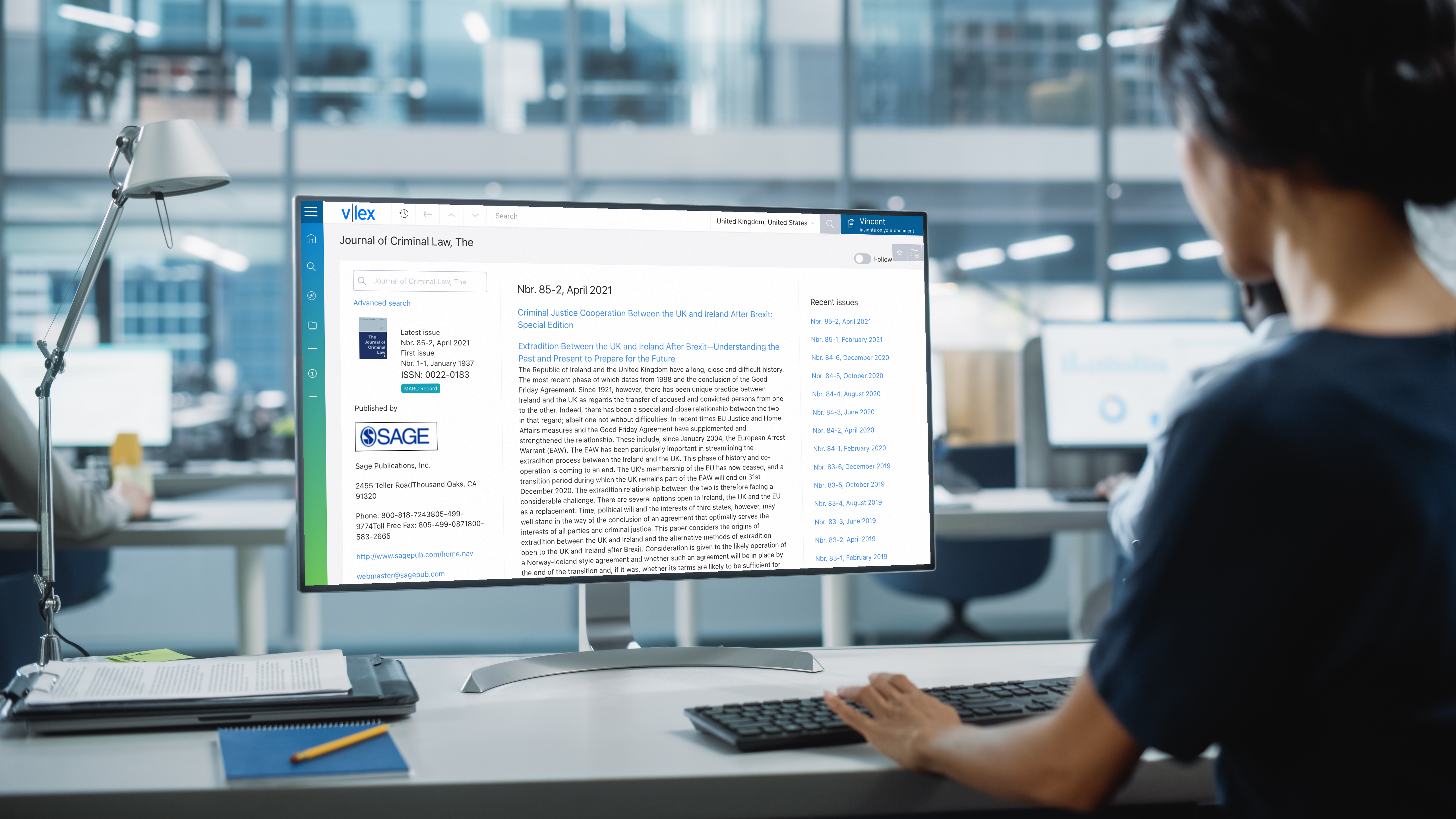International Law and Technology Writing Competition
This year’s competition is now closed. Follow vLex on social media to find out about next year's competition.
400+
Students from hundreds of universities worldwide have taken part.
£10,000+
Over ten thousand pounds has been awarded to students.
70,000+
Winning articles reach thousands of legal professionals worldwide.
About
The writing competition
This year's competition is now closed
For the seventh consecutive year, the vLex International Law and Technology Writing Competition invites students from around the world to submit a 1000-word, blog-style article on one of three topics. The overall winner will receive a grand prize of £1,500, alongside the publication of their entry to a global legal audience. Additionally, each runner-up will be awarded £250 each for Best in Category.

Topics
Three new categories
vLex has picked three new writing categories for this year's competition. Whichever one of these topics you choose to focus on, your submission must clearly identify how the law and technology have had an impact on the key topic. Explore the keywords below to kick-start your research.
Topic 1
Immigration
A focus on immigration, linking to technology and law.
How has technology played an integral role in the governance, lives and legal rights of refugees? How can law practices use technology to best serve clients with complex immigration cases? What impact do surveillance and artificial intelligence technologies have on immigration and human rights laws? These are just examples of questions that your article could address. Your article could also focus on lessons learned from border enforcement strategies, international politics, or the role of sociocultural factors: this category is open for interpretation.
Keywords: Asylum, Humanitarian Protection, Citizenship, Common Travel Area, Deportation, Human Rights, Refugee, Migration, Indefinite Leave to Remain, Immigration Rules, European Economic Area (EEA), Judicial Review, Settled, Work Permits, and economic, socio-cultural and political factors.


Topic 2
Large Language Models
A focus on large language models, and how they are shaping technology and the law.
Could large language models revolutionise the legal industry? Do the shortcomings of large language models outweigh the benefits to legal practices? How is large language model technology influencing the law and legal research? These are just examples of questions that your article could address, this category is open for interpretation.
Keywords: AI Model, ChatGPT, Text Classification, Characterization, Data Set, Training, Summarisation, Retrieval, Optimisation, Generate, Semantic Search, Recommendation System.
Topic 3
Industrial Action
A focus on industrial action in relation to technology and the law.
Has greater access to the law and technology influenced recent strike action? What role has technology played in the evolution of employment law? How do trade union reps utilise technology and the law to navigate industrial negotiations on pay, terms and conditions, ect? These are just examples of questions that your article could address, this category is open for interpretation. Your article could also focus on protecting workers' rights, conditions, and standards, ensuring the workforce has a voice, public opinions, and so on.
Keywords: Striking, Picketing, Worker's Rights, Workplace Conditions, Labour, Pay, Unfair Dismissal, Trade Union, Ballot, Industrial Dispute.

Submission guidelines
Competition rules
Please read the submission instructions in full. Then complete the registration form.
You must use your university email address, or attach proof of student status upon entry. This can include a dated official letter from your university or student identification, which must show an expiry date. If you are due to graduate before the end of the competition, please submit an alternative email address too.
- All entries must be submitted in a Word document format (.doc or .docx)
- You must be over the age of 18 to enter the competition.
- All entries must be in English and should not include any images.
- All entries must include the title of the article within the Word document.
- Please name your Word document files appropriately. The suggested naming convention: Your name - Article Title
- Before submitting, you agree to have read and understood all terms and conditions.
- Only submit original writing, that you have written for this competition. All entries will be subject to plagiarism checks.
- All entries must be submitted before 23:59 UK time, on Jan 1, 2024.
Additional guidance
Importantly, your article needs to consider both the law, technology and the key topic. Your article can answer important questions for your chosen area, such as, how does technology impact the law? Or how did technology help drive change in the law where legislative gaps once existed?
Your article needs to be about real-world events and cannot be entity fiction. If fiction is to play a role in your article - whether used to demonstrate a scenario or potential future event, ensure the reader understands how that connects with what is happening in the real world.
Data, research and examples are good. Some of our best and winning articles give a clear indication as to why the topic they are writing about is important, using data, research and examples. The reader of your article may not know the topic as well as you do, hence why it is important for you to make this clear from the start: Why is this topic important, why should the reader care (and importantly keep on reading), and what are the key ‘takeaways’ from the article.
Before you start writing, please read the guidance below, submission criteria and competition terms. You can submit one entry per category. Need some inspiration? Read all the past winning articles on the vLex Blog.
FAQs
I have just graduated, can I enter?
Unfortunately, at the time of submission (Jan 1, 2024), you need to be a registered student.
Do I need to be a law student to enter?
No, you can be a student from any discipline to enter the competition.
Can articles have dual authorship?
All articles must be written by a single author and should not contain any content unless correctly referenced.
What reference style should be used?
Remember this is a blog-style article, where links are usually used directly with the text. If you wish to use a reference style please use Harvard or OSCOLA.
Can I add images or appendices?
Unfortunately, no images or appendices can be included in your articles.
What can I use as proof of student status?
Please submit your article using your university or college email. If you do not have one, please attached a dated letter from your university confirming your student status, or a valid student identification with an expiry date visible.
Hall of fame
Overall winners
- 2023, Lucy Cameron, University of Oxford, for Keeping Up With Kryptocurrency
- 2022, Rahul Vyan Nayar, National University of Singapore, for Thaler, Artificial Intelligence and the Law
- 2021, Anokhy Desai, University of Pittsburgh, USA, for Amending 230 for Public Safety
- 2020, Malwina Anna Wojcik, University of Bologna, Italy, for Machine-learnt bias?
- 2019, Kim Rust, University of Sheffield, UK, for Block-chain reaction
- 2018, Roisin Costello, Trinity College Dublin, Ireland, for The Tortoise and the Hare?
Hall of fame
Best in category winners
- Juliette Groothaert, University of Bristol, for Big Data Analytics in Sports: its Controllership, Privacy, and Commercialisation, 2023
- Xiaoli Jin, Harvard Law School, for How to Measure Crypto Decentralization: Reconciling a Legal and Technical Approach, 2023
- George Jeffreys, University of Law, for Why Patents and Climate Change Just Don’t Mix, 2023
- Brian Collins Ocen, Makerere University, Uganda – Winner of the Future category, 2022
- Joshua Neaman, City, University of London – Winner of the Past category, 2022
- Malcolm Superville, The Hugh Wooding Law School, Trinidad and Tobago – Winner of the Present category, 2022
- Keshinro Oluwalani Deborah, The University of Lagos – Movement, Law & Technology, 2021
- Sara Kachwalla, BPP University – Influence, Law & Technology, 2021
- Malcolm Superville, The University of the West Indies – Money, Law & Technology, 2021
- Armin Amirsolimani, University College London – Access to justice and technology, 2020
- Janis Wong, University of St Andrews – Social media, data and privacy, 2020
- Alicia Lim, London School of Economics – Technology and the future of legal practice, 2020
- Eleanor De of City, University of London – Access to Justice and Technology, 2019
- Iphigenia Fisentzou, BPP University – Social Media, Technology and the Law, 2019
- Walter Myer, University of Oxford – The Future of Legal Technology, 2019
- Patrick Alexander Hum, London School of Economics, 2018
- Secil Bilgic, Harvard University, 2018
- Jae Jun Kim, University of Auckland, 2018
Hall of fame
Past judges
- Dr. Shaun Wallace, Barrister and The Dark Destroyer on ITV1’s The Chase
- Robert Rinder, Barrister, Presenter and Columnist for The Sun and the Evening Standard
- The Secret Barrister, Barrister and author of the award-winning No. 1 bestseller The Secret Barrister
- Richard Tromans, Founder and CEO of Tromans Consulting and Artificial Lawyer
- Aishah Hussain, Reporter for LegalCheek, the most read legal website in the UK
- Emily Allbon, Senior Lecturer, Director of Mooting, Assistant Dean Student Experience and Communication, City, University of London
- Dr Liz Dowthwaite, Research Fellow in Horizon Digital Economy at the Trustworthy Autonomous Systems Hub at the University of Nottingham
- Prof. Roger V. Skalbeck, Professor of Law, Associate Dean for Library and Information Services for University of Richmond School of Law
- Nicole Allaband, Editor-in-Chief, Richmond Journal of Law & Technology
- James Williams, Annual Survey & Symposium Editor, Richmond Journal of Law & Technology
- Ilya Mirov, Senior Articles Editor, Richmond Journal of Law & Technology
- Eli Hill, Annual Survey & Symposium Editor, Richmond Journal of Law & Technology
- Ruth Bird, Former Bodleian Law Librarian, University of Oxford, and former Vice President of the International Association of Law Libraries
- Tom Bangay, Director of Content, Juro
- David F. Wills, Editor, Legal Information Management (LIM); Squire Law Librarian, University of Cambridge
- Masoud Gerami, Managing Director for vLex Global Markets
- Aidan Hawes, Head of Commercial Development, vLex Global Markets
- Nicola Stephenson, Head of Training, vLex Global Markets
International Law and Technology Writing Competition
T&Cs
Everything you need to know to enter The vLex International Law and Technology Writing Competition.
The International Law & Technology Writing Competition (the “competition” and “LITWC” ) is open to students aged 18 and over, with the exception of employees of vLex, their family members, or anyone else connected to the competition. All information detailing how to enter forms part of these terms and conditions.
It is a condition of entry that all rules are accepted as final, and that the entrant agrees to abide by these rules. Submission of an entry will be taken as an acceptance of these terms and conditions.
To enter the competition, you must write a blog-style article of no more than 1,000 of your own words on one of the proposed topics. Please do not include any pictures. Entries with photos, diagrams or illustrations may be excluded.
A maximum of one entry in each category is permitted per entrant. You may only enter each individual submission in one category, but you may write another submission about a different topic for a different category. See below for prize terms.
Submissions should be entered using the form provided on the competition page in Word format only. You must state which of the categories you are entering, and must include your full name, email address, university or college and country of residence. Failure to include valid information, or excluding information, may void your entry.
Entries must be the original work of the individual submitting them and must not have been published before in any other publication (or on any website), they must not contain any third party materials and/or content that you do not have permission to use, must not promote your own or third party goods or services, or include any trademarks and must not promote inappropriate or dangerous behaviour, or otherwise be obscene, defamatory, distasteful, offensive or in breach of any confidentiality obligations owed by you to any third party. Joint submissions are not allowed.
If you have any questions about how to enter or otherwise in connection with the competition, please email us at hello@vlex.com with “International Law & Technology Writing Competition” in the subject line.
The competition closes at 23:59 GMT on Jan 1, 2024. Entries received after this time will not be considered. vLex reserves the right to extend the closing date for a reasonable period of time where an insufficient number of entries have satisfied the entry and judging criteria.
You own the copyright to your submission as its author. However, by submitting an entry to the competition you grant a worldwide, irrevocable, perpetual license to vLex and their partners to feature any or all of the submission in any of its publications, its websites and/or in any promotional material connected to this competition listed on this page or otherwise. You also grant vLex and their partners the right to use your name, academic institution and country of residence for the sole purpose of identifying you as the author of your submission and/or as a winner or runner-up of the competition. This also applies to the authors of shortlisted entries.
We may disqualify your competition entry for the following reasons: your entry does not comply with these terms and conditions; you are not eligible to enter the competition; you are unable to provide proof of your student status; you cannot be contacted. In the event of disqualification(s), we may reselect winners in accordance with the selection and/or judging processes.
Should you wish to withdraw from the competition for any reason, please email us at hello@vlex.com. The competition will be judged by a panel of representatives of vLex. The judges will choose one winning entry for the competition, and one runner-up in each of the three categories. The judges’ decision will be made on or before April 2024, with this date subject to change at any time. The winner and runners-up will be contacted by email after this date. The judges’ decision is final and no correspondence will be entered into.
The overall winner will receive a prize by BACS and the three runners-up will each receive a prize by BACS or other suitable payment method approved by vLex, and have their submission published in the company newsletter, on the blog section of the vLex and vLex Justis websites, and published by vLex partner(s) in accordance with the benefits stated on this page. This could include publishing your entry on their website, in their publications and more.
Shortlisted entries may also have their submission posted on the blog section of the vLex and vLex Justis websites and/or by partners. All shortlisted entries will be made available to partners for publication.
Each entrant is only eligible for a single prize. This excludes the overall winner from also winning a runners-up prize with a second submission or an individual entrant from winning multiple runners-up prizes with a second or third submission.vLex reserves the right to substitute the prizes with other prizes of similar value.
vLex reserves the right at any time to modify these terms and conditions, or to modify or discontinue, temporarily or permanently, this competition with or without prior notice due to reasons outside its reasonable control (including, without limitation, in the case of anticipated, suspected or actual fraud). The decision of vLex in all matters relating to the competition is final and no correspondence will be entered into. vLex will not be liable for any failure to comply with its obligations relating to this competition where the failure is caused by something outside its reasonable control. The competition and these terms and conditions will be governed under the laws of England and Wales, and entrants to the competition submit to the non-exclusive jurisdiction of the English courts.
For students
More competitions
Follow vLex on social media to find out about all future student competitions.